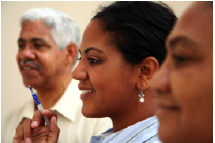What supports can school leaders provide to develop effective and committed special education teachers?
Page 3: Goals of a Comprehensive Induction Program
 The goals of a comprehensive induction program are usually decided at the state or district level. Leaders need to consider what they want to accomplish through their induction programs and create goals accordingly. This might mean that the components or emphases of the induction program may vary from year to year. On a yearly basis, school leaders can collect data related to the induction program goals (e.g., surveys, classroom observations, student test data), evaluate the success of the program, and make changes accordingly. The purposes and goals of the induction program should be clearly communicated to all involved in supporting new special education teachers as well as to the new teachers themselves. Below are some suggestions for global goals, followed by more specific examples that represent sample district and school induction goals.
The goals of a comprehensive induction program are usually decided at the state or district level. Leaders need to consider what they want to accomplish through their induction programs and create goals accordingly. This might mean that the components or emphases of the induction program may vary from year to year. On a yearly basis, school leaders can collect data related to the induction program goals (e.g., surveys, classroom observations, student test data), evaluate the success of the program, and make changes accordingly. The purposes and goals of the induction program should be clearly communicated to all involved in supporting new special education teachers as well as to the new teachers themselves. Below are some suggestions for global goals, followed by more specific examples that represent sample district and school induction goals.
Provide supports to help new special education teachers develop into effective teachers
- Help teachers find curriculum materials to meet individual student needs
- Assure that teachers understand and use the Common Core curriculum and student performance standards
- Provide professional development on how to write individualized education programs (IEP)
individualized education program (IEP)
glossary
Facilitate the process of new special education teachers becoming part of the school community
- Encourage new teachers to participate in team-building events
- Introduce new special education teachers to veteran special educators, and encourage the new teachers to view them as a source of support
Retain effective special education teachers
- Provide teachers with wellness and stress-management supports
- Respond to teachers’ concerns in a timely fashion
Activity
Recall the example of Jamal from this module’s Challenge. He is certified as a K–8 PE teacher and has passed his state’s special education certification test. He was hired to teach middle school students with emotional disorders in a self-contained classroom. He will have to teach his students all of the content areas (e.g., reading, social studies). As his school leader, what induction program goals would you develop for Jamal?
Jamal has a challenging assignment, requiring a high level of content knowledge, teaching skills, and classroom management skills. Jamal may need more supports than a typical new teacher since he has not completed a teacher preparation program. Fortunately he has enough knowledge to have passed the special education exam. Several key goals for Jamal could include:
- Learning the curriculum content for the middle grades, particularly areas that are assessed through the Common Core State Standards and also areas in which he has less knowledge
- Identifying and learning evidence-based instructional practices for teaching students with disabilities
- Developing a plan for behavior management as well as specific procedures that will be followed when challenging behaviors are addressed